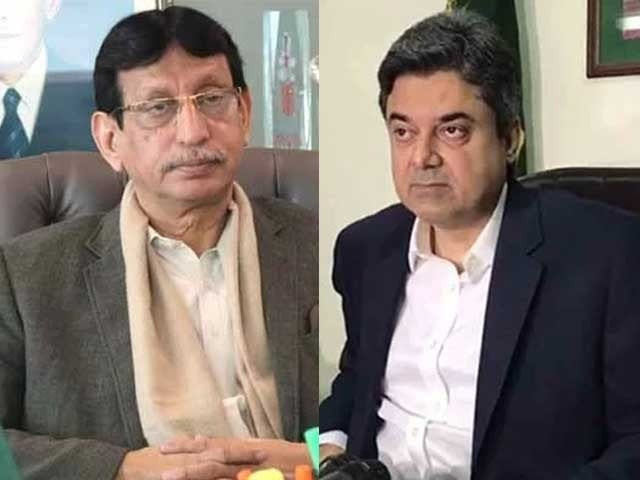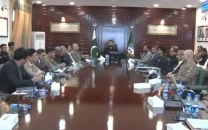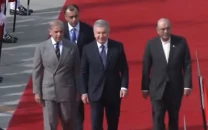MQM-P minsters call it quits
Party ditches PTI, backs opposition’s no-trust move

Two federal ministers belonging to the MQM-P -- Farogh Naseem and Aminul Haque -- on Wednesday resigned from their portfolios and sent their resignation letters to Prime Minister Imran Khan as their party formally parted ways with the PTI and announced backing the opposition parties’ no-confidence motion against the premier in the National Assembly.
MQM-P Convener Dr Khalid Maqbool Siddiqui made the announcement at a news conference in Islamabad alongside the leadership of the joint opposition – leaving the ruling coalition short of seven votes in the lower house of parliament.
The move is enough to give opposition parties a clear edge over the treasury benches in the lower house of parliament required to send the premier packing.
After deliberating for weeks, the opposition parties finally managed to persuade the government’s coalition partner to go against the premier on the no-confidence motion.
The MQM-P came in the position to make or break the government after the PML-Q – another key ally at the Centre and in Punjab -- decided to side with the PTI.
This happened when the premier took a resignation from Punjab Chief Minister Usman Buzdar and offered the position to PML-Q leader Chaudhry Parvez Elahi in exchange for his party’s support on the no-trust motion.
Though the resignation has not yet been accepted, MQM-P’s move has left both the PTI and PML-Q red-faced as they have lost three crucial wickets — PM Imran, CM Buzdar and would-be CM Elahi — on a single delivery.
With the MQM-P siding with the opposition, the latter officially now has more than the required numbers to oust PM Imran’s government through the vote of no confidence even without the PTI’s roughly two dozen dissidents.
Read Govt leads opp by two votes in no-confidence number game
The decision was announced after the joint opposition front and MQM-P leadership reached written agreements, assuring the latter that all its demands would be fulfilled.
"We have gathered at a historic moment. More than congratulations, this is a test through which the national leadership has to pass," MQM-P’s Siddiqui said at the news conference.
"Today is also a day for prayers. Common people's wishes have been fulfilled. I expect that this time we can [try to achieve] a democracy whose effects can reach the common people of Pakistan,” he added.
"We have given priority to Pakistan's interests over all individual interests. We have joined you [the opposition] on this journey with these expectations. We have no individual or party benefits. Every clause of our agreement is for the common public of Pakistan and especially for those areas that we have been representing for the last 35 years. The areas for which we believe immediate steps are needed."
Speaking on the occasion, PML-N President Shehbaz Sharif, who is also the leader of the opposition in the National Assembly, said today was an important day in the country’s history because a joint opposition had come together and efforts have been made for national unity.
"I want to thank the MQM-P and its activists, who respected the wishes of the 220 million people of Pakistan and made this decision. I am especially thankful to [PPP Co-Chairperson] Asif Ali Zardari and [PPP Chairman] Bilawal [Bhutto-Zardari] that through this whole process of negotiations, they kept the history aside. They have initiated this journey of Pakistan's prosperity and Karachi's happiness," he added.
"This agreement will be implemented in letter and spirit.”
Bilawal also expressed his gratitude to the MQM-P and described its decision of backing the opposition as "historic".
He added that that the PPP and MQM-P's working relationship was not related to the no-confidence motion only. “The PPP and MQM-P have to work together under any condition, if we want to work for Karachi and Pakistan's prosperity.”
The PPP chairman said PM Imran had now lost his majority.
“He is not the prime minister anymore. The parliament session is tomorrow [Thursday]. Let's hold voting tomorrow and settle this matter. We can then start working on transparent elections and the journey towards restoration of democracy. The end to economic crisis can then begin."
Read: Imran directs MNAs to stay away from no-trust session
JUI-F chief Maulana Fazlur Rehman, who also heads the opposition alliance Pakistan Democratic Movement (PDM), also welcomed MQM-P's decision.
"This decision is an expression of national unity for not only Karachi and the rest of Sindh but the whole of Pakistan.”
The JUI-F chief pointed out that with allies joining the opposition, the latter’s strength in the National Assembly now stood at 175 while it needed only 172.
Akhtar Mengal, the president of a former government ally BNP-M, asked the premier to step down as he had lost the majority.
Following the formal announcement, MQM-P's Siddiqui signed a pair of agreements — one with the PPPP chairman over promises related to Sindh and another with PML-N's Ahsan Iqbal over commitments regarding the federation.
The MQM-P has signed a 27-point pact with the PML-N and a 12 point agreement with the PPP. The agreements were signed by Fazl, Mengal, Siddiqui, Bilawal and Shehbaz.
In its pact signed with the PPP, the two parties have agreed to respect each other’s mandate.
Both parties have agreed to a long-term working relationship. The Sindh government would present an amendment draft on the local governments within a month and fully implement the top court’s order on the matter. The draft would be passed by the provincial assembly within 30 days and the new law would in accordance with Article 140. A political personality – proposed by the MQM-P -- would be appointed by the Karachi administrator.
Local government would be distributed funds in accordance with the National Finance Commission formula of 2010.
For the Hyderabad Municipal Corporation, the MQM-P would suggest three names to the Sindh government, which would select one of them for the post.
Similarly the MQM-P would suggest three names for the Karachi commissioner, and the provincial government would select one of them for the slot.
The MQM-P would also suggest three names each for the district municipal corporations of Karachi Central, Korangi and East. The provincial government would select one of them for the post of the district administrator.
The 60:40 quota for the urban and rural area as of the province would also be implemented.
The problem of a fake domicile would be addressed through an investigation commission formed in very district. A parliamentary committee with equal representation would oversee the matter of job quota. To overcome the problem of lawlessness, a local police system would be introduced.
Fake cases registered against MQM-P activists would be withdrawn.
Read: Fazl, Shehbaz call on MQM-P convener
A development package would be prepared by a joint committee keeping in view the needs of the urban and rural Sindh.
The master plan for Karachi would be finalised immediately and the city’s transport system of the city upgraded on a priority basis.
A public sector university for women would be set up in Karachi.
Karachi’s safe city project would be completed at the earliest. The city would have a cottage industrial zone after improving its law and order situation.
The industrial infrastructure of Karachi, as well as the education and health sectors of the city would be given special attention.
A university would be set up in Hyderabad immediately.
In the pact inked with the PML-N, the MQM-P has demanded that it would be considered a major stakeholder of urban Sindh.
The party would be consulted while making decisions about the urban areas of the province.
The next general elections would be held after holding a fresh, transparent census.
The appointment of the provincial police chief and the chief secretary would be made after taking the MQM-P on board.
The MQM-P would be taken into confidence before giving the nod to Sindh’s infrastructure including major development projects.
Efforts would be made for the recovery of missing persons.
When it comes to job in the federal government, the quota of the urban Sindh would be taken into consideration.
The ban on the activities of the MQM-P would be lifted and it should be assisted in reopening of its offices.
The pact also includes giving a package to the traders of Karachi and upgrading the water supply system in the city.
The beaches of the city would be developed in accordance with the standards of the modern world and the Karachi Circular Railway project would also be given priority.
The agreement also carries the demand for provision of the freedom of expression and the immediate withdrawal of the Prevention of Electronic Crimes Act (PECA).



















COMMENTS
Comments are moderated and generally will be posted if they are on-topic and not abusive.
For more information, please see our Comments FAQ